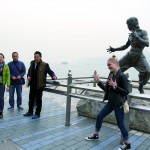Shoestring Travel Ltd. receives funding from the scheme to organise a “Wing Chun” Kung Fu Experience Tour for tourists who are interested in Chinese martial arts.
Wing chun master Sam Lau Kung-shing, who owns Shoestring Travel, says the board subsidises 50 per cent of his spending on promotions, including the cost of printing advertising materials and renting exhibition halls. Through the scheme, he has attended international tourism conventions to promote his kung fu tours to foreign countries.
Lau participated in the World Travel Market 2013 in London, and was at ITB Berlin, a leading travel trade show, last year. He says he would never have been able to get a foot in the door without support from HKTB. With offices around the world, Lau says the board can help his company gain recognition. “To let the foreigners know [about the tour], so when they come to Hong Kong, they don’t need to do research on which is good or bad,” he says.

But not all providers of alternative tours are as positive about how the HKTB can benefit them. Some say the board only posts comprehensive itineraries provided by well-established niche tourism companies. This limits the reach of small travel companies that focus on specific fields like eco-tourism, food tourism and culture tourism, and makes it hard for visitors to come into contact with more diverse tourism experiences in Hong Kong.
Tammy Cheung, the marketing and corporate communications manager of Eco Travel Limited, says: “If we give them [HKTB] three or four products they just display one…We have a limited channel to advertise ourselves as a small business and it is very difficult to promote ourselves.”
In addition to improving the “software” such as promotion and publicity, Cheung hopes the government can also provide more supporting facilities and services to support eco-tours that last for several days. She says there is not enough accommodation for visitors to stay in the countryside and compares this to the multitude of guesthouses in Taiwan.
Cheung also points out that in some popular ecotourism destinations like Tung Ping Chau, one of the eight geo-areas of Hong Kong Geopark, restaurants and stores only operate on weekends. “There is no food, no water from Monday to Friday,” she says.
Not only do these sites lack food, electricity and basic amenities for tourists, they are not hooked up to tap water. Restaurants there are forced to use underground water but this does not comply with the Public Health and Municipal Services Ordinance, which means they cannot be officially licensed. Villagers have been requesting tap water but the government has turned them down, citing low cost efficiency.
The inconvenience to tourists is compounded by a lack of information on official websites warning visitors about the lack of catering services on the island.
However, legislator Sin Chung-kai, who was an HKTB member from 2009 to 2014, does not think Hong Kong needs more facilities for eco-tours. “Hong Kong is very small, I think you can’t compare it with others like Taiwan,” he says. Besides, he thinks very few people would be interested in eco-tours lasting for several days.
Sin says the government has been working on attracting more international visitors by allocating most of the HKTB’s promotion budget for international markets. He says it is difficult to change the make-up and proportion of visitors from different countries and regions as the government simply cannot put a cap on the number of visitors from any specific places.
Despite the steep growth in the number of mainland tourists and the resulting conflicts, Sin thinks Hong Kong’s image as an international city still prevails and that the city’s tourism does not rely too much on mainland tourists.
However, he concedes the predominance of mainland tourists does affect the arrival of overseas tourists as it drives up demand for hotel rooms, leading to higher prices which deter overseas visitors from coming to Hong Kong.
Dr Andrew Chan, an assistant professor of the School of Hotel and Tourism Management at the Hong Kong Polytechnic University, agrees mainland tourists have pushed up hotel room rates and displaced some overseas tourists.
But he believes the long-term impact brought by the huge number of mainland tourists goes beyond price hikes. He says having too many mainland tourists will damage the image of Hong Kong as an international city, because the huge number of mainland visitors affects Hong Kong’s overall environment as a travel destination.
“The atmosphere makes [overseas] tourists think that Hong Kong is overcrowded,” Chan says, “especially long-haul tourists from Europe; they think Hong Kong is more crowded than they could have imagined.”
Edited by Grace Cheung






































